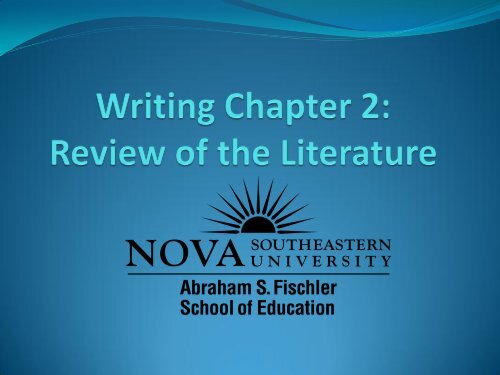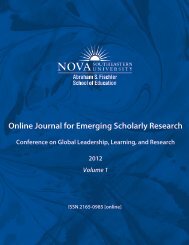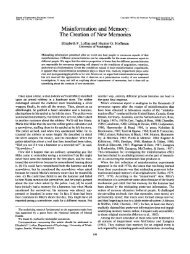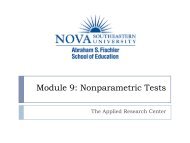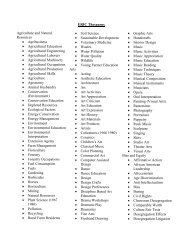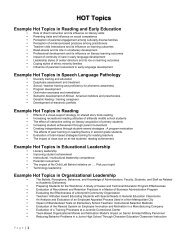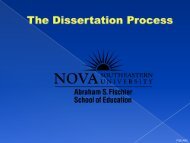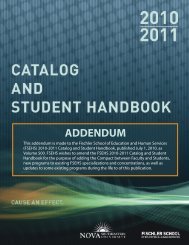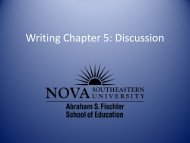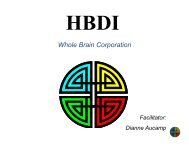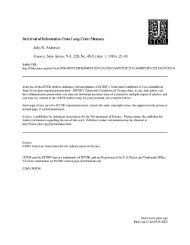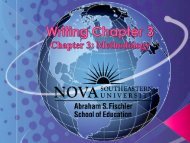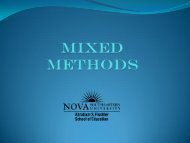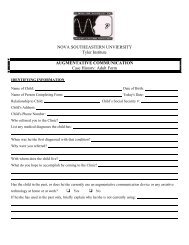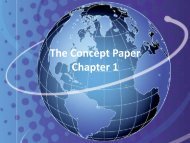What Is a Literature Review? - 1 - Nova Southeastern University
What Is a Literature Review? - 1 - Nova Southeastern University
What Is a Literature Review? - 1 - Nova Southeastern University
You also want an ePaper? Increase the reach of your titles
YUMPU automatically turns print PDFs into web optimized ePapers that Google loves.
<strong>What</strong> <strong>Is</strong> a <strong>Literature</strong> <strong>Review</strong>?<br />
• Mainly Chapter 2 of a doctoral dissertation<br />
• An exhaustive exposition of the literature sources<br />
(especially methods and findings) that a researcher<br />
consulted in order to understand and investigate his or<br />
her research problem<br />
• Built from the annotated bibliography assignment (#4)<br />
from the Methods of Inquiry (MOI) course
Purpose of a <strong>Literature</strong> <strong>Review</strong><br />
• “Put your salesperson’s hat and sell your idea!”<br />
• Use the literature to explain your research.<br />
• Show why your research needs to be carried out<br />
(justification).<br />
• Show how you choose to work with specific methodologies<br />
or theories.<br />
• Show how your work adds to the research already carried<br />
out.<br />
3
Components of Chapter 2<br />
• Discussion of theoretical or conceptual framework<br />
of study<br />
• Synthesis of up-to-date research findings<br />
• Discussion of the role of current research<br />
(replication, variation, etc.) and role of<br />
independent variables<br />
• <strong>Review</strong> of strengths and weaknesses of prior<br />
studies<br />
• Critique of literature in light of any controversial<br />
methodological decisions to be made<br />
• Research questions
Always <strong>Review</strong> the ARC Website<br />
• http://www.fischlerschool.nova.edu/<br />
• applied-research/arc<br />
• The online Applied Dissertation Procedures Manual<br />
suggests that Chapter 2<br />
• be exhaustive<br />
• contains at least 30 references from recent peerreviewed<br />
research articles<br />
• comprises at least 25-30 pages
Information on <strong>Literature</strong><br />
<strong>Review</strong> Sources<br />
• NSU’s online library is used to obtain sources<br />
• Sources should mainly be journal articles<br />
• Primarily refereed articles (i.e., editors publish only the<br />
most relevant and reliable research)<br />
• Should offer relatively concise and up-to-date<br />
research<br />
6
More on Sources<br />
Books<br />
• may not be up to date; mainly used for the theoretical<br />
framework<br />
• are intended for teaching, not for research<br />
• offer a good starting point in finding more detailed<br />
sources.<br />
7
More on Sources<br />
Conference proceedings are<br />
• very useful in providing the latest published and<br />
unpublished research.<br />
• helpful in providing information about other<br />
researchers and their scholarly activities.<br />
8
More on Sources<br />
Government and corporate reports<br />
• Governmental departments, corporations, and<br />
commissions may carry out research.<br />
• Their published findings can provide a useful source of<br />
supporting information.<br />
9
More on Sources<br />
Newspapers<br />
• provide information that is of very limited use in a<br />
literature review.<br />
• may be more helpful in providing information about<br />
recent trends, discoveries, or changes.<br />
10
More on Sources<br />
Theses and dissertations<br />
• can be difficult to obtain because they may be<br />
unpublished and available only from the library shelf<br />
or through interlibrary loan.<br />
• represent the work of students who may not be<br />
experienced researchers.<br />
• should be considered with greater caution than<br />
published research.<br />
11
More on Sources<br />
The Internet<br />
• Anyone can post information on the Internet, so the<br />
quality may not be reliable.<br />
• The information may be intended for a general<br />
audience and, therefore, may not be suitable for<br />
inclusion in a literature review.<br />
• The quality of some refereed electronic journals may<br />
be more reliable (depending on the reputation of the<br />
journal).<br />
12
More on Sources<br />
Magazines<br />
• Magazines intended for a general audience<br />
(e.g. , Time) are unlikely to be useful in<br />
providing the type of information that a<br />
researcher needs.<br />
• Specialized magazines may be more useful<br />
(e.g., business magazines for management<br />
students).<br />
• Magazines may be useful as a starting point<br />
for research.<br />
13
Tips on How to Write a<br />
Good <strong>Literature</strong> <strong>Review</strong><br />
• It is a process<br />
• Do not assume that you will<br />
read everything related to<br />
your research.<br />
• Writing can help you to<br />
understand and find<br />
relationships between the<br />
sources that you have<br />
researched; therefore, do not<br />
put writing off until you have<br />
finished your readings.<br />
• Writing is a way of thinking,<br />
so allow yourself time to write<br />
as many drafts as you need,<br />
changing your ideas and<br />
information as you learn<br />
more about the context of<br />
your research problem.<br />
• Always keep bibliographic<br />
information in your notes.<br />
Include accurate and properly<br />
cited references in your<br />
writing.
More Tips on How to Write a<br />
Good <strong>Literature</strong> <strong>Review</strong><br />
• Writing is similar to the<br />
traditional 5-paragraph<br />
essay<br />
(intro/body/conclusion)<br />
• Sentences should be<br />
connected<br />
• Paragraphs should be<br />
connected<br />
• Use of transitional words<br />
and phrases<br />
• Inclusion of a short<br />
introduction to Chapter<br />
2<br />
• Role of subheadings<br />
• Always consider the<br />
“other side of the coin”<br />
• Inclusion of a short<br />
conclusion to Chapter 2
More Tips on How to Write a<br />
Good <strong>Literature</strong> <strong>Review</strong><br />
Read with a purpose<br />
• When summarizing the literature, you must<br />
also decide which ideas or information are<br />
important to your research (i.e., so that you can<br />
emphasize them).<br />
• You should also look for the major concepts,<br />
conclusions, theories, and arguments that<br />
underlie the literature.<br />
• Look for similarities and differences with<br />
closely related work.<br />
16
More Tips on How to Write a<br />
Good <strong>Literature</strong> <strong>Review</strong><br />
Write with a purpose<br />
• Your optimal goal should be to evaluate and show<br />
relationships between past research and your own.<br />
• To do this effectively, you should carefully plan how<br />
you are going to organize your work.<br />
• A chronological system will not be an effective way to<br />
organize your work (in some situations).<br />
17
More Tips on How to Write a<br />
Good <strong>Literature</strong> <strong>Review</strong><br />
Plan your writing<br />
• Find a way to organize your material so that you know<br />
what you are going to write about, in what order, and<br />
what you are going to say.<br />
• Try writing an outline.<br />
18
More Tips on How to Write a<br />
Good <strong>Literature</strong> <strong>Review</strong><br />
Prioritize your writing<br />
• When you plan your writing, don't be overly<br />
concerned about language. Concentrate on<br />
what you are going to say.<br />
• Don't put too much effort into proofreading<br />
until you are sure that what you want to write is<br />
the best you can come up with.<br />
• Once the content is sufficiently expressed, you<br />
can work on grammar, syntax, punctuation,<br />
spelling, and so forth.<br />
19
More Tips on How to Write a<br />
Good <strong>Literature</strong> <strong>Review</strong><br />
Write and rewrite<br />
• More experienced writers rewrite more often and<br />
more substantially than less experienced writers.<br />
• Good writing takes time. The better a writer you<br />
become, the more you will see that your first<br />
thoughts, ideas, and language can be improved.<br />
• Give yourself time to rewrite so that your readers<br />
see the best of your thoughts and writing, not the<br />
best you could come up with at the last moment.<br />
20
More Tips on How to Write a<br />
Good <strong>Literature</strong> <strong>Review</strong><br />
Find readers<br />
• Ask people to read what you've written. Ask<br />
friends, professors, and capable colleagues for<br />
feedback.<br />
• Don't expect your writing to be perfect, but<br />
strive for perfection.<br />
• Give people drafts and let them know what sort<br />
of feedback you want (e.g., comments on<br />
organization, ideas, language, or the technical<br />
aspects of what you've written).<br />
21
<strong>What</strong> to Include in the<br />
References Section<br />
• ONLY the sources that have been cited (e.g., direct<br />
quotations, paraphrasing) in the dissertation
Sample Chapter 2 Outline<br />
• Dissertation title: Student-Advisor Interaction in Undergraduate<br />
Online Degree Programs: A Factor in Student Retention<br />
• Chapter 2: <strong>Literature</strong> <strong>Review</strong><br />
• History of Distance Education<br />
• History of Academic Advising<br />
• Factors That Contribute to Online Student Retention<br />
• Interaction in Education<br />
• Theoretical Framework—Student/Advisor Interaction<br />
• The Academic Advising Needs of Students in Online Degree<br />
Programs<br />
• Student/Advisor Interaction—Implications for Research and<br />
Practice<br />
• Gaps in <strong>Literature</strong> – Student/Advisor Interaction in Online Degree<br />
Programs<br />
• Research Questions
Avoiding Plagiarism:<br />
Rule of Thumb<br />
“If you write something that leads your<br />
professor to ask ‘Who said that? or<br />
‘Where did that come from?’ it needs to<br />
be cited.”<br />
FSE Program Professor
Should I cite?<br />
No<br />
<strong>Is</strong> it a<br />
quote?<br />
<strong>Is</strong> it a<br />
paraphrase?<br />
Yes<br />
Yes<br />
Use quotation<br />
marks and cite it<br />
Cite it<br />
No<br />
<strong>Is</strong> it another’s<br />
idea/theory?<br />
Yes<br />
Cite it<br />
No<br />
There is no need to cite if it’s<br />
common knowledge or your<br />
own thoughts<br />
Mark Seldine, EdD<br />
Director, Student Judicial Affairs
Avoiding Plagiarism<br />
“Learning how to use sources is one of the most important<br />
things you will learn in college. By using sources well and by<br />
clearly indicating your debts to these sources, your writing<br />
gains authority, clarity, and precision . . . . So long as you are<br />
scrupulous about indicating material you have quoted and<br />
immediate borrowings you’ve made in paraphrases, you will<br />
not be suspected or guilty of plagiarism.”<br />
DePauw <strong>University</strong>. (n.d.). Avoiding plagiarism. Retrieved at<br />
http://www.depauw.edu/admin/arc/w-center/plag.asp<br />
Mark Seldine, EdD<br />
Director, Student Judicial<br />
Affairs
Resources<br />
Creswell, J. W. (2008). Educational research: Planning, conducting,<br />
and evaluating quantitative and qualitative research (3rd ed.).<br />
Upper Saddle River, NJ: Pearson Education.<br />
Gravel, C. (2010). Student/advisor interaction in undergraduate online<br />
degree programs: A factor in student retention (Doctoral dissertation<br />
proposal). <strong>Nova</strong> <strong>Southeastern</strong> <strong>University</strong>.<br />
http://library.ucsc.edu/help/howto/write-a-literature-review<br />
http://writing.wisc.edu/Handbook/<strong>Review</strong>of<strong>Literature</strong>.html<br />
http://www.sportsci.org/jour/9901/wghreview.html<br />
27


